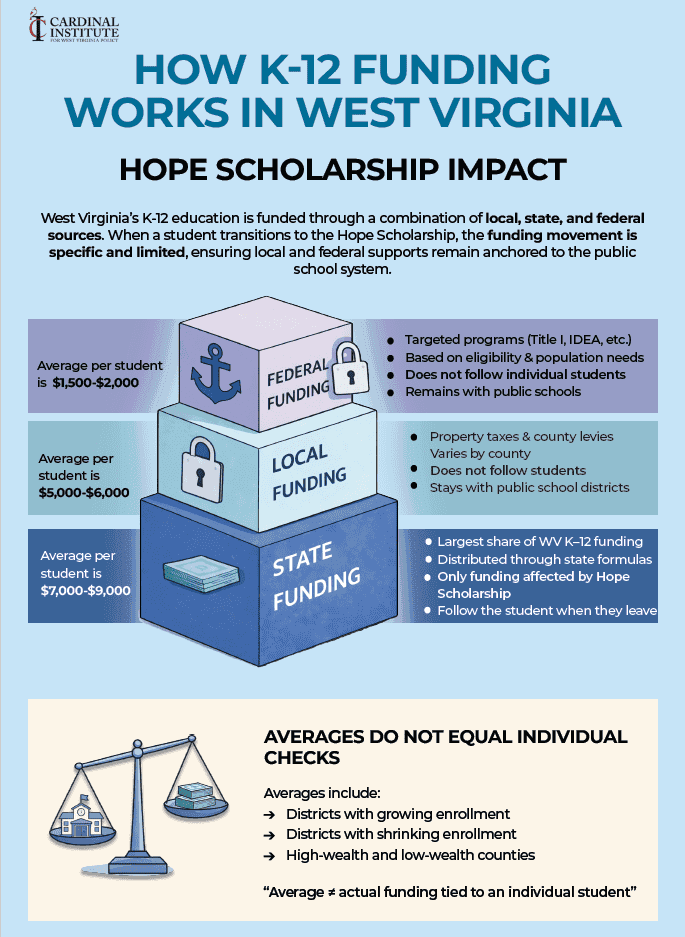
OP-ED: New Hope Scholarship Application Cycle Means More Opportunity for More WV Students
New Hope Scholarship Application Cycle Means More Opportunity for More WV Students
This op-ed was originally published with the Spirit of Jefferson newspaper on Feb. 28th, 2024.
On March 1, the Hope Scholarship will open applications for the 2024–2025 school year, kicking off a new year-round application process recently announced by the West Virginia Treasurer’s Office. While the announcement is welcome news to many families, it drew criticism from opponents of school choice who claim that the Hope Scholarship program is draining funds from West Virginia’s K–12 public schools.
However, evidence shows that educational opportunity from the Hope Scholarship, West Virginia’s education savings account (ESA), is a large benefit for families in the Mountain State.
Critics claim public schools will lose up to an estimated $21.6 million in the 2024–2025 school year. What they don’t say is that this amount represents just half a percent (0.5%) of the total $3.9 billion in funding that West Virginia’s public school system received in the school year 2020–2021. If losing half a penny for every dollar will cripple a system, what does that say about the system?
Moreover, not all Hope Scholarship students participated for the entire school year. This reduced the average per-pupil ESA cost for the first year of operation to less than $4,000, which is just one-fourth of the average per-pupil cost to educate students in West Virginia’s public school system ($15,679). When we look at the total funds, the Hope Scholarship represents only 0.2% of the total funding that West Virginia’s public schools receive while educating 0.9% of the state’s students. Thus, when students leave the public school system via the Hope Scholarship, state and local taxpayers experience substantial savings.
Additionally, important context is found when one digs deeper into West Virginia’s education finances. Officials are concerned about a potential fiscal cliff and blaming the Hope Scholarship, but the real reason that West Virginia’s 55 school districts will have $392 million less in the upcoming school year is the expiration of federal Elementary and Secondary School Emergency Relief (ESSER) funds. Public school districts chose to commit temporary COVID-era bailout funds to permanent expenses despite warnings from experts, and despite knowing from the beginning these temporary funds intended to help schools cope with the COVID-19 pandemic would expire.
But discussions of the finances behind the Hope Scholarship shift the focus away from what’s most important – educating kids. Do school choice programs help students? The academic evidentiary record suggests that they do.
Of 31 systematic reviews and meta-analyses, 24 indicate that outcomes overall lean positive, seven indicate overall findings were neutral, mixed, or inconclusive, and no research review indicated an overall negative effect of private educational choice for the following outcomes: participant test scores, competition, attainment, integration, civic values and practices, fiscal effects, and school safety. Notably, 25 of these systematic reviews have been published in peer-reviewed journals, and 25 of these reviews have been published in the last 10 years.
The Hope Scholarship program is popular with West Virginia families, evidenced by more than 6,000 students who received Hope Scholarships during the 2023–2024 school year. Many of these families say that the Hope Scholarship has helped them to educate their kids.
For Nancy, a parent from Calhoun County, “The Hope Scholarship has afforded us the ability to have curriculum, educational tools, and supplies that wouldn’t have been possible otherwise.”
Hope is a big value-add for Amanda, a parent from Marion County. “I have twins (5) who are HopeSchool kids. The scholarship is a major blessing to our family. I use it for everything from science equipment to speech therapy lessons. It is a tremendous benefit.”
Laura, a parent from Wood County states, “The Hope Scholarship has given us the chance to afford the education we wanted for our daughter. She is thriving at her school, and we wouldn’t have been able to make this work without Hope. We are thankful for the program.”
Hope is a blessing for these and many other parents. This isn’t to say that public schools don’t help kids. Some children thrive in a public school system because that model is a good fit for them. Of course, one type of schooling can’t be a good fit for every child, and that’s the point of school choice and the Hope Scholarship. Without programs like Hope, some families would not have the opportunity to access a learning environment that works best for their child’s situation.
West Virginia’s families want and need the educational freedom that the Hope Scholarship provides. It benefits everyone and is a building block for more opportunity in the Mountain State.
Dr. Martin Lueken is the Director of EdChoice’s Fiscal Research and Education Center (FREC), and Amanda Kieffer is the Vice President of Communications & Strategy for the Cardinal Institute for WV Policy. EdChoice is a 501(c)(3) nonprofit, nonpartisan organization working to advance educational freedom and choice for all students as a pathway to successful lives and a stronger society. The Cardinal Institute for West Virginia Policy, Inc. is a 501(c)(3) non-profit dedicated to researching, developing, and communicating effective free-market public policies for West Virginia.








